Criticism of US Travel Advice Amid Rwanda's Marburg Outbreak
Overview
- Rwanda grapples with its first Marburg virus outbreak, resulting in tragic fatalities, especially among healthcare workers.
- Jean Kaseya, head of Africa CDC, strongly criticizes the US travel advisory, deeming it unjust and harmful to Rwanda's progressive efforts.
- In response, Rwanda is initiating vaccine trials while implementing rigorous public health measures to curb the outbreak.

Rwanda's Struggle with the Marburg Virus
Currently, Rwanda is facing a serious challenge as it deals with its first outbreak of the Marburg virus. This situation has become particularly alarming with reports of 13 deaths, mostly affecting dedicated healthcare workers who are at the frontline of the battle. One nurse, who wishes to remain anonymous, shares her feelings of dread as she watches her colleagues suffer from this deadly disease. Her daily struggle highlights the emotional and physical toll the outbreak takes on medical professionals. The Rwandan government is not standing still; they have implemented several crucial strategies—such as limiting funeral gatherings to curb viral transmission and enhancing border surveillance to prevent the spread into neighboring regions. Despite the crisis, officials are determined to maintain control and protect public health.
US Travel Advisory: A Controversial Stance
In response to the Marburg outbreak, the US Centers for Disease Control and Prevention (CDC) has issued a travel advisory, suggesting that Americans avoid all non-essential travel to Rwanda. However, this guidance has sparked significant controversy. Jean Kaseya has openly condemned these warnings, characterizing them as unjust and harmful. He argues that such advisories could not only deter necessary international support but also undermine the ongoing public health efforts within the country. Kaseya's vocal criticism calls for a reconsideration of this approach, as he stresses that Rwanda is battling the outbreak with effective strategies and a firm commitment to safeguard its citizens and visitors alike.
A Proactive Public Health Response
Rwanda's response to the Marburg virus involves an extensive public health strategy that includes vaccine trials and widespread testing. The country is collaborating with organizations like the Sabin Institute to trial vaccines, aiming to safeguard its healthcare workers first. While many dedicated professionals, such as the aforementioned nurse, have yet to receive the vaccine, they remain steadfast in their commitment to caring for patients. Additionally, the government is increasing awareness and testing for symptoms that mimic malaria, understanding that early detection is crucial in managing the outbreak. Reflecting on past health crises, particularly the Ebola epidemic, Rwanda is employing valuable lessons to bolster its health systems. This proactive and collaborative approach is a testament to the critical importance of international partnerships in facing global health emergencies and ensuring the safety of every community.

Loading...